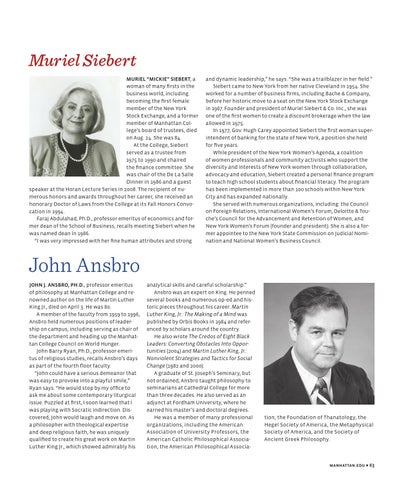Muriel Siebert Muriel “Mickie” Siebert, a woman of many firsts in the business world, including becoming the first female member of the New York Stock Exchange, and a former member of Manhattan College’s board of trustees, died on Aug. 24. She was 84. At the College, Siebert served as a trustee from 1975 to 1990 and chaired the finance committee. She was chair of the De La Salle Dinner in 1986 and a guest speaker at the Horan Lecture Series in 2008. The recipient of numerous honors and awards throughout her career, she received an honorary Doctor of Laws from the College at its Fall Honors Convocation in 1994. Faraj Abdulahad, Ph.D., professor emeritus of economics and former dean of the School of Business, recalls meeting Siebert when he was named dean in 1986. “I was very impressed with her fine human attributes and strong
and dynamic leadership,” he says. “She was a trailblazer in her field.” Siebert came to New York from her native Cleveland in 1954. She worked for a number of business firms, including Bache & Company, before her historic move to a seat on the New York Stock Exchange in 1967. Founder and president of Muriel Siebert & Co. Inc., she was one of the first women to create a discount brokerage when the law allowed in 1975. In 1977, Gov. Hugh Carey appointed Siebert the first woman superintendent of banking for the state of New York, a position she held for five years. While president of the New York Women’s Agenda, a coalition of women professionals and community activists who support the diversity and interests of New York women through collaboration, advocacy and education, Siebert created a personal finance program to teach high school students about financial literacy. The program has been implemented in more than 100 schools within New York City and has expanded nationally. She served with numerous organizations, including: the Council on Foreign Relations, International Women’s Forum, Deloitte & Touche’s Council for the Advancement and Retention of Women, and New York Women’s Forum (founder and president). She is also a former appointee to the New York State Commission on Judicial Nomination and National Women’s Business Council.
John Ansbro John J. Ansbro, Ph.D., professor emeritus of philosophy at Manhattan College and renowned author on the life of Martin Luther King Jr., died on April 3. He was 80. A member of the faculty from 1959 to 1996, Ansbro held numerous positions of leadership on campus, including serving as chair of the department and heading up the Manhattan College Council on World Hunger. John Barry Ryan, Ph.D., professor emeritus of religious studies, recalls Ansbro’s days as part of the fourth floor faculty. “John could have a serious demeanor that was easy to provoke into a playful smile,” Ryan says. “He would stop by my office to ask me about some contemporary liturgical issue. Puzzled at first, I soon learned that I was playing with Socratic indirection. Discovered, John would laugh and move on. As a philosopher with theological expertise and deep religious faith, he was uniquely qualified to create his great work on Martin Luther King Jr., which showed admirably his
analytical skills and careful scholarship.” Ansbro was an expert on King. He penned several books and numerous op-ed and historic pieces throughout his career. Martin Luther King, Jr.: The Making of a Mind was published by Orbis Books in 1984 and referenced by scholars around the country. He also wrote The Credos of Eight Black Leaders: Converting Obstacles Into Opportunities (2004) and Martin Luther King, Jr.: Nonviolent Strategies and Tactics for Social Change (1982 and 2000). A graduate of St. Joseph’s Seminary, but not ordained, Ansbro taught philosophy to seminarians at Cathedral College for more than three decades. He also served as an adjunct at Fordham University, where he earned his master’s and doctoral degrees. He was a member of many professional organizations, including the American Association of University Professors, the American Catholic Philosophical Association, the American Philosophical Associa-
tion, the Foundation of Thanatology, the Hegel Society of America, the Metaphysical Society of America, and the Society of Ancient Greek Philosophy.
MANHATTAN.EDU N 63
